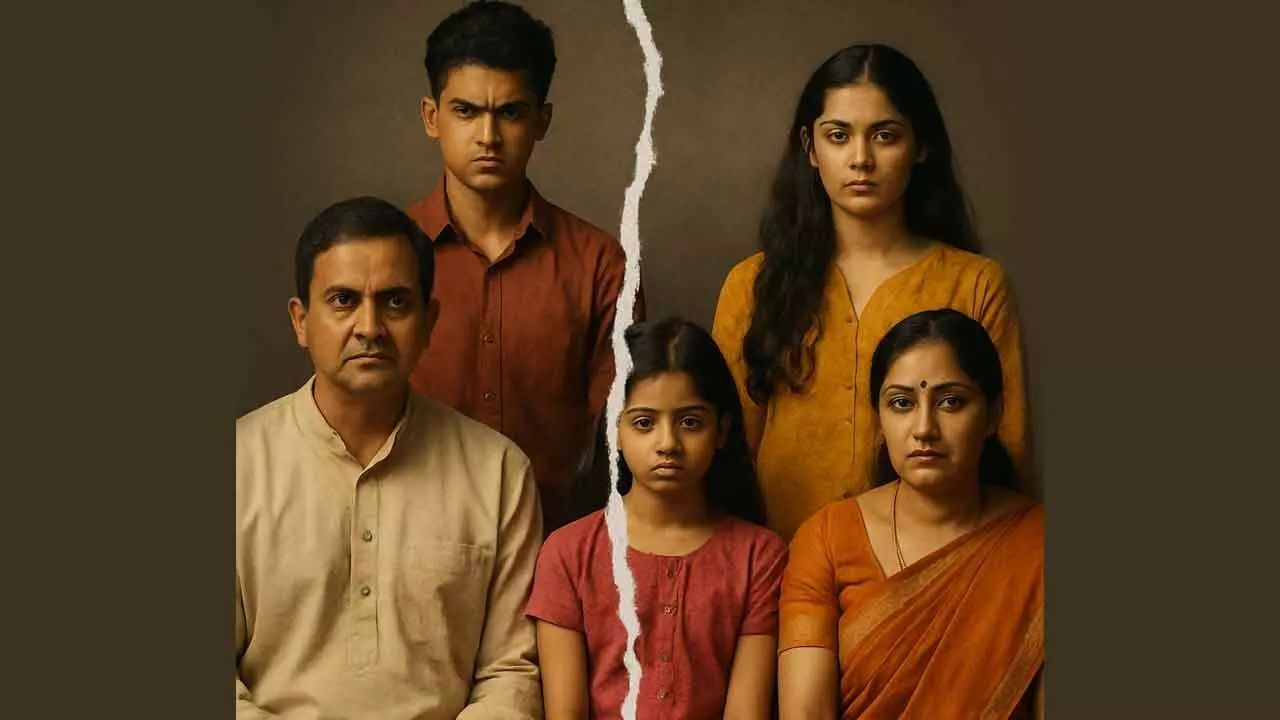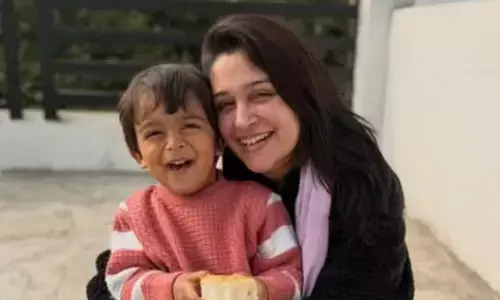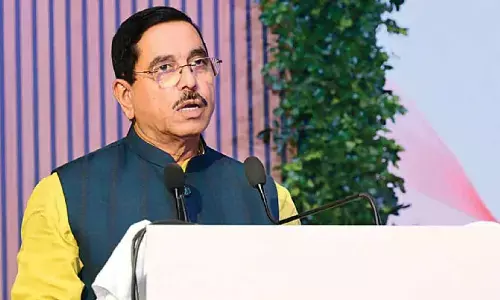Is the institution of family under threat?

In many homes, grandparents are seen as obsolete, parents are seen as equals, and children as CEOs of the household. Everyone has a voice, but no one has weight. This isn’t equality, this is anarchy. Our family system once ensured that decisions were filtered through generations. Now, decisions are crowd-sourced on social media or made impulsively. Emotional hierarchy is what enabled continuity, tradition, and safety. Without it, we are left with families that function like democracy without direction, noisy, confused, and vulnerable
A few weeks ago, I came across a chilling news report, a newly married woman in Uttar Pradesh, aided by her lover, murdered her husband just days after their wedding. The crime wasn’t just brutal, it was methodically planned, cold-blooded, and executed without remorse. As disturbing as it was, what rattled me more was this, it wasn’t an isolated incident. Almost every week, there is a headline involving familial betrayal, violence, or emotional collapse within what is supposed to be society’s safest and most sacred unit, the family.
It compelled me to ask, not rhetorically but with growing alarm, Is the institution of family under threat in India? I believe it is. Not from economic hardship or cultural invasion, but from internal erosion, from rebellion masquerading as progress, from indulgence mistaken as love, and from a dangerous complacency across generations.
Rebellion at home: When children stop listening
I grew up in a time when questioning parents was unthinkable. Not because we were oppressed, but because we respected the lived wisdom that guided us. Today, many young people seem to take pride in rebellion for rebellion’s sake. What used to be curiosity is now confrontation. Guidance is dismissed as control. Correction is labelled abuse. And discipline is seen as toxic authority.
Children aren’t just disobeying, they are detaching. Parents no longer hold the moral authority to influence life choices. I hear of teenagers threatening to walk out of their homes because their phone privileges were reduced. I see young adults ridiculing their parents online to gather likes. We’ve arrived at a cultural milestone where defiance is a badge of honour and humility is a sign of weakness. This rebellion is not just generational friction, it is a full-blown rejection of the foundational ethic that makes family possible, reverence.
Collapse of family hierarchy: Roots of domestic anarchy
The family is not a flat organisation. It’s a sacred hierarchy, of age, of experience, of responsibility. When elders lose their rightful place, families descend into chaos. We are now seeing this collapse playing out in real time.
In many homes, grandparents are seen as obsolete, parents are seen as equals, and children as CEOs of the household. Everyone has a voice, but no one has weight. This isn’t equality, this is anarchy. Our family system once ensured that decisions were filtered through generations. Now, decisions are crowd-sourced on social media or made impulsively. Emotional hierarchy is what enabled continuity, tradition, and safety. Without it, we are left with families that function like democracy without direction, noisy, confused, and vulnerable.
Emotionally bankrupt bonds: Transactional living under one roof
Technology was supposed to bring us closer. Ironically, it has disconnected us emotionally within our own homes. We are digitally glued, but emotionally distant. Dinners are eaten in silence, with screens for company. Conversations have become
logistical. Celebrations are Instagram-driven. Love is measured in gifts, not gestures.
Families are no longer emotionally interdependent. We now operate like co-tenants, each with separate emotional lives. The result? Parents who feel irrelevant. Children who feel unseen. Spouses who feel lonely even in the same bed.
A family is meant to be a haven for healing, laughter, correction, and connection. What we are witnessing instead is emotional bankruptcy under glittering façades.
The vanishing parent as role model
One of the most tragic transformations of recent times is the dilution of parental identity. Parents are increasingly unsure of themselves. Many are caught in an internal conflict, wanting to be friends rather than guides, afraid of appearing strict, and confused by changing social narratives. In this overcorrection, parents are now either absent or apologetic. The idea of being a role model has been replaced by the desire to be liked. Children are observing this vacuum. When they don’t see conviction at home, they seek direction elsewhere, from influencers, peers, or worse, misguided celebrities. If parents don’t stand tall, children will stoop to seek validation elsewhere. Parenting is not about popularity. It is about principled presence.
Marital meltdown: When trust exits, crime enters
Marriage in Indian society was once considered sacred, not just a personal bond but a societal commitment. Today, it increasingly resembles a contract with escape clauses. We’re seeing a sharp rise in divorces, not always due to abuse or incompatibility, but due to weariness, ego clashes, and hyper-personal expectations. ‘Irreconcilable differences’ has become a euphemism for ‘I won’t compromise.’
Even more alarming is the spike in infidelity, and in extreme cases, spousal crimes. Murder within marriage is no longer fiction, it’s a growing phenomenon. And it’s not always driven by passion, it’s often calculated, cold, and premeditated.
Marriage is being stripped of its meaning, honesty, loyalty, forgiveness, and resilience are being replaced with selfishness, deception, and betrayal. This isn’t just personal failure. It’s a failure of the moral framework that held our families together.
Woke culture, broken culture: Celebrating collapse as liberation
We are living in a time where being “woke” often translates to being morally unanchored. Every cultural tradition is under suspicion. Every value-based structure is labelled oppressive. Every challenge to discipline is celebrated as liberation.
What used to be integrity is now seen as rigidity. What used to be sacrifice is now foolishness. And what used to be responsibility is now termed emotional labour.
Empowerment without character is entitlement. And freedom without morality is destruction. We are raising a generation that knows their rights but mocks their roots. A generation intoxicated with the idea of personal freedom, but allergic to personal responsibility.
And our society is complicit. From television to web series, from influencer reels to corporate culture, everyone is reinforcing the message that family values are passé, and chaos is cool.
A society without a compass: Where do we go from here?
When families fail, it’s not just a private issue. It’s a public epidemic. What begins at home spills into society, into classrooms, into corporate corridors, into courts. We now see children who cannot take feedback, adults who crumble under pressure, and leaders who lack empathy. The schoolteacher is blamed, the system is blamed, but the question remains, who raised these people?
Our community institutions have fallen silent. Religious centers are less about guidance and more about rituals. Schools are under-equipped to replace parental voids. And society at large is consumed by consumerism. In this moral vacuum, we are raising a generation without maps, without mentors, and without meaning.
Reclaiming the sacred institution
So, can we reverse this collapse? I believe we can. But it requires immediate, intentional action.
1. Reinstate value education: We must teach our children not just arithmetic, but right attitude. Bring ethics, civics, empathy, and family studies back into school curricula.
2. Empower parents with clarity: Offer parenting workshops that emphasize role modelling, emotional intelligence, and constructive discipline.
3. Stop glorifying dysfunction: Mainstream media like TV, Movies, OTT must be held to account. Romanticizing betrayal, mocking tradition, and celebrating infidelity should not be passed off as bold storytelling.
4. Strengthen marital foundations: Normalize therapy, marriage counselling, and community mentorship. Encourage pre-marital workshops on value alignment, not just horoscope matching.
5. Rebuild community anchors: Temples, cultural associations, and community centres must return to their role as value-based ecosystems, not just venues for rituals or politics.
6. Learn presence: Encourage families to spend time, talk, eat together, celebrate without screens, and invest in real bonding. Let’s stop outsourcing love, discipline, and belonging. Let’s reclaim it, within our own homes.
Final reflection: It’s not too late
The Indian family is not a relic of the past; it is the very nerve centre of our civilizational identity. It is the first school, the first hospital, the first counselling centre, and the first temple. When we protect it, we protect the nation.
But even the strongest structures collapse when ignored. If we allow this cultural corrosion to continue, we will raise citizens of a country that may be digitally developed, but spiritually desolate. We do not inherit the family. We recreate it, with every choice, every conversation, every act of presence. Let us not wait for further destruction. Let us begin reconstruction. Because when families die, nations don’t live too long.
(Author is the Chief Spokesperson of BJP, Chairman of the Nation Building Foundation, a Global expert in Emotional Intelligence, and a Harvard Business School Certified Strategist)




















